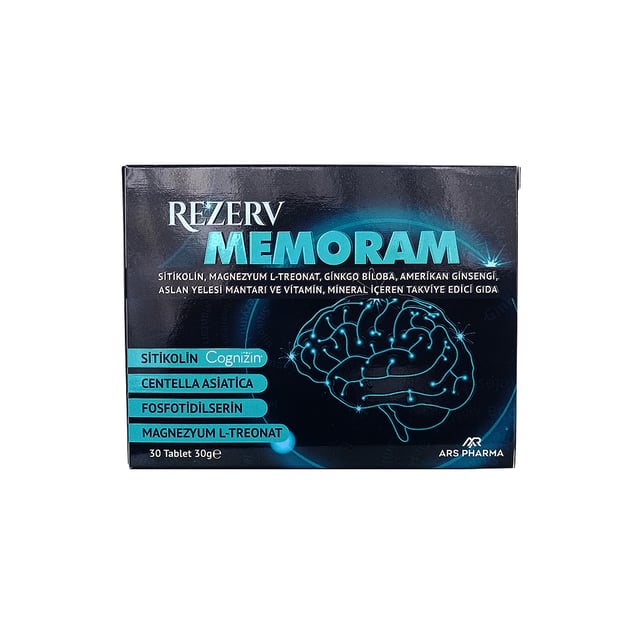Citicoline:
- Helps improve memory and brain functions.
- Supports memory and attention improvement in both healthy individuals and those with vascular dementia.
- Aids in improving cognitive function in individuals with Parkinson’s disease when used as an adjunct to primary therapy.
- Possesses neuroprotective properties, offering protective effects against neurodegenerative diseases like Alzheimer’s disease.
- Helps increase levels of dopamine and norepinephrine in the central nervous system, contributing to the protection of neurons under hypoxic conditions.
- Acts as a precursor for the synthesis of phosphatidylcholine, a component of neuronal cell membranes. Therefore, it helps stimulate the repair and regeneration of damaged neuronal cell membranes.
- Helps reduce cognitive deficits.
- Can be used as an adjunctive therapy in the treatment of depression and mood regulation.
- Supports vision loss (glaucoma) and a group of eye disorders like amlodipi.
Magnesium L-threonate:
- Unlike most magnesium supplements, magnesium L-threonate has high bioavailability.
- Effectively increases magnesium levels in the brain and neurons.
- Has significant benefits in improving memory and cognition.
- Helps alleviate symptoms of migraines, Alzheimer’s disease, and stroke.
- Shown to have beneficial effects on subjective anxiety in individuals prone to mental stress, such as reducing exam anxiety associated with stressful test conditions.
- Supports memory improvement through the activation of NMDA receptors.
- Helps reduce pain.
- Can be used as supportive treatment in attention and hyperactivity disorders.
Phosphatidylserine:
- A natural component of neuronal cell membranes, essential for healthy nerve cell membranes and myelin.
- Supports safely slowing down biochemical changes and structural deterioration in nerve cells.
- Aids in short-term memory and consolidation of long-term memory.
- Helps enhance the ability to learn and remember information.
- Supports increased attention focus and concentration, reasoning, and problem-solving abilities.
- Helps improve language skills and communication abilities.
Vitamin B6 (Pyridoxine): Increases magnesium absorption from the intestines.
Vitamin D: Enhances the reabsorption of magnesium in the kidneys and increases magnesium absorption from the gastrointestinal tract.
L-arginine:
- Affects learning and memory, synaptic plasticity, and helps strengthen neuroprotective effects in the brain.
- Supports the prevention of cognitive decline in Alzheimer’s patients.
- Can be used as supportive therapy to prevent cognitive deficits caused by both epilepsy and anticonvulsants used in epilepsy treatment.
- Helps reduce oxidative damage and improve mitochondrial functions in the brain, supporting stress reduction.
- Important as a supportive measure in reducing stress-related brain damage and slowing aging.
- Helps reduce behavioral depression.
Lion’s Mane Mushroom:
- Supports potential improvement in mild cognitive impairment.
- Helps reduce symptoms of depression and anxiety.
- Aids in the rapid recovery of nerve injuries.
- Effective in protecting against stomach ulcers.
- Supports reducing inflammation.
- Helps enhance thinking and memory processes.
- May help protect against Alzheimer’s disease and other types of dementia.
American Ginseng:
- Used as supportive treatment for memory loss.
- Helps significantly improve working memory and mental arithmetic.
- Supports improving attention.
- Aids in improving cognitive function, behavior, and some aspects of quality of life in dementia patients.
Gotu Kola:
- Helps improve memory and overall cognitive functions as an adjunct treatment for Alzheimer’s disease.
- Can help reduce anxiety and stress, particularly caused by sleep disorders.
- Supports antidepressant treatment.
- May help alleviate insomnia.
Ginkgo Biloba:
- Used as supportive therapy to enhance cognitive memory abilities.
- Effective as supportive therapy for a wide range of cerebral function disorders, from ischemic vascular cerebral disorders (e.g., multi-infarct dementia) to early cognitive impairments.
- Helps improve symptoms and signs of cognitive functions in mild to moderate cases of age-related dementia (including Alzheimer’s disease) or mixed origin (i.e., psycho-organic origin), particularly in memory loss, attention, alertness, arousal, and mental fluidity.
- Helps facilitate behavioral adaptation to stress and reduce excessive cortisol release due to stress.
- Aids in reducing functional retinal disorders caused by ischemia-reperfusion, photodegeneration, diabetic, or proliferative retinopathy.
- Promising in slowing the progression of Alzheimer’s disease.
Biotin:
- Supports neurotransmitter activity and nerve signaling along with other B complex vitamins, aiding the functioning of the nervous system.
- Together with B vitamins, helps protect the brain from oxidative effects.
- Supports memory improvement.
- Aids in improving cognitive functions.
- Helps defend against neurodegenerative disorders. Biotin and other B vitamins can help treat dementia and Alzheimer’s disease as well as improve concentration.
Caffeine:
- Helps improve memory performance.
- Aids in increasing brain activity associated with working memory to improve behavioral performance.
- Supports overall performance improvement without reducing increased attention processes.
- Helps reduce mental distress and fatigue.
- Supports improving physical and mental performance.
Vitamin C:
- Prevents short-term and long-term memory impairments caused by sleep deprivation.
- Helps reduce learning disabilities.
- Supports reducing cognitive decline due to aging with its antioxidant effects.
- Helps alleviate memory loss in Alzheimer’s patients.
- Used as supportive therapy to reduce ischemic areas in the brain following a stroke.
Vitamin B12:
- Supports improving learning and memory abilities.
- Helps reduce cognitive decline.
- Supports the treatment of coordination disorders in the elderly.
 0536 997 02 57
0536 997 02 57
 Türkçe
Türkçe









